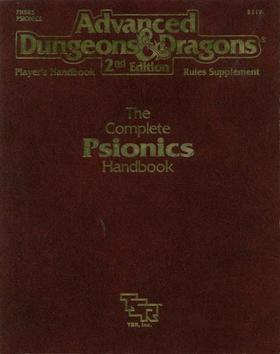You're telling me the AD&D Mystic which is what it is called, which is a wandering ascetic with psionic powers, is in no way releated to the UA Mystic, a wandering ascetic with psionic powers.
No, AD&D didn't have a Mystic Class at all, that was a Basic Class from the Master Set, which was actually the BD&D take on the Monk. 1E didn't have a Psionics Class at all, just personal powers that you might get during rolling a PC.
The 2E Class was the Psionicist, which was absolutely nothing like the 5E Mystic:
"The psionicist's skills are based on the Wisdom and Constitution ability scores, and while humans can attain higher levels of expertise, all races are eligible for the class. Characters of chaotic alignment are not allowed to become psionicists, with the rationale being that volatile chaotic characters lack the discipline required to focus their mental energies. Psionic powers are assigned to six disciplines, which include clairsentience (divination), psychokinesis (animating and controlling existing objects and forces), psychometabolism (body-changing powers), psychoportation (teleportation variants), telepathy (mental communication and psychic attacks), and metapsionics (enhancement of other psychic abilities). Powers are designated as either sciences (major powers) or devotions (minor powers). As a psionicist gains experience and advances in level, he acquires more powers, and as a psionicist rises through the ranks, he also gains access to defense modes - special telepathic powers, which are received free of charge and don't count against a psionicist's normal power limits."
"The use of psionic powers involves a variant of the proficiencies system developed in the 2nd Edition rules. Each power has a score rated in terms of a particular attribute. When attempting to use a power, the player makes a Power Check by rolling 1d20 and comparing the result to the Power Score. A roll less than or equal to the Power Score means success. Additionally, each power description includes a specific penalty suffered by the psionicist if a 20 is rolled. A psionicist has a fixed number of Psionic Strength Points, derived from his wisdom score, to expend on psionic powers. A psionicist expends the number of PSPs required by a particular power, then attempts a Power Check. If the check fails and the power doesn't work, he forfeits half the PSP cost but is free to try again later. If he passes the check and the power is successful, the psionicist has the option of expending additional PSPs to maintain the power in subsequent rounds. Psionicists recover lost PSPs every hour in which no additional PSPs are expended. The less physical exertion, the more PSPs recovered; a walking PC recovers 3 PSPs per hour, and a resting PC recovers twice as many."

en.m.wikipedia.org



